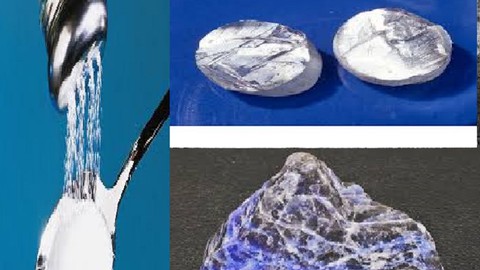
s-block Elements
s-block Elements, available at $19.99, with 22 lectures, and has 1 subscribers.
You will learn about The students will have a clear vision about the Alkaline earth metals. They will know about Alkali Metals. The learners will become confident in concepts of block elements, periodic table and metals. The learners will know about metals like sodium, potassium. This course is ideal for individuals who are Beginners and eleventh standard students. It is particularly useful for Beginners and eleventh standard students.
Enroll now: s-block Elements
Summary
Title: s-block Elements
Price: $19.99
Number of Lectures: 22
Number of Published Lectures: 22
Number of Curriculum Items: 22
Number of Published Curriculum Objects: 22
Original Price: $19.99
Quality Status: approved
Status: Live
What You Will Learn
- The students will have a clear vision about the Alkaline earth metals.
- They will know about Alkali Metals.
- The learners will become confident in concepts of block elements, periodic table and metals.
- The learners will know about metals like sodium, potassium.
Who Should Attend
- Beginners and eleventh standard students.
Target Audiences
- Beginners and eleventh standard students.
The elements in the long form of the periodic table has been divided into four blocks, namely s, p, d & f blocks. The elements
of group I & II receive their last electron in s-orbital. So they are called as s – block elements.
The metals Lithium (Li), sodium (Na), potassium (K), rubidium (Rb), cesium (Cs) and francium (Fr) which have one electron in
their outermost shell belongs to group I and are called alkali metals as they react with water to form hydroxides which are
strong bases or alkalies.
The elements of group II are Beryllium (Be), Magnesium (Mg), Calcium (Ca),Strontium (Sr), barium (Ba) and radium (Ra) which
have two electrons in their outermost shell. All these elements are also metallic in nature and are commonly known as alkaline
earth metals with the exception of beryllium. Because of their low density, alkali metals and alkaline earth metals are called
lighter metals. Both alkali and alkaline earth metals are highly reactive and hence do not occur in free state but found in
combined state. Whereas alkali metals mostly occur as halides, oxides, silicates, borates and nitrates, alkaline earth metals
mainly occur as silicates, carbonates, sulphates and phosphates. Some alkali & alkaline earth metals occur abundantly in
nature. Calcium is the fifth, magnesium is the sixth, sodium is seventh and potassium is eight barium is the fourteenth and
strontium is the fifteenth most abundant element by weight in the earth’s crust. Sodium and magnesium are also present in
sea water brine wells and few salt lakes.
Anomalous behaviour of first element
The first element of a group differs considerably from the rest of the elements of the same group. This anomalous behaviour is due to
(i) Smaller size of their atoms
(ii) Their higher ionization energies
(iii) Their higher electronegativities
(iv) Absence of vacant d – orbitals in their valence shell
(v) High polarizing power of its cation.
Course Curriculum
Chapter 1: Introduction
Lecture 1: Contents of s – block Elements
Lecture 2: Diagonal relationships
Lecture 3: Physical Properties of Alkali Metals
Lecture 4: Chemical Properties of Alkali Metals
Lecture 5: General characteristic of the compounds of the alkali metals
Lecture 6: Salts of oxoacids
Lecture 7: Extraction of Lithium
Lecture 8: Properties of Lithium
Lecture 9: Properties of Sodium
Lecture 10: Sodium Peroxide
Lecture 11: Sodium Carbonate (Washing soda)
Lecture 12: Potassium carbonate
Lecture 13: Alkaline Earth Metals
Lecture 14: Reactivity and Electrode potential
Lecture 15: Chemical Properties of Group – II elements
Lecture 16: General characteristics of compounds of the Alkaline
Lecture 17: Sulphates
Lecture 18: Anomalous Behaviour of Beryllium
Lecture 19: Properties of Magnesium
Lecture 20: Oxides of Magnesium and Calcium.
Lecture 21: Calcium Carbonate
Lecture 22: Industrial uses of lime and Limestone
Instructors
-
Vinay Arya
Chemistry Teacher for IIT Aspirants and School Students
Rating Distribution
- 1 stars: 0 votes
- 2 stars: 0 votes
- 3 stars: 0 votes
- 4 stars: 0 votes
- 5 stars: 0 votes
Frequently Asked Questions
How long do I have access to the course materials?
You can view and review the lecture materials indefinitely, like an on-demand channel.
Can I take my courses with me wherever I go?
Definitely! If you have an internet connection, courses on Udemy are available on any device at any time. If you don’t have an internet connection, some instructors also let their students download course lectures. That’s up to the instructor though, so make sure you get on their good side!
You may also like
- Best Video Editing Courses to Learn in March 2025
- Best Music Production Courses to Learn in March 2025
- Best Animation Courses to Learn in March 2025
- Best Digital Illustration Courses to Learn in March 2025
- Best Renewable Energy Courses to Learn in March 2025
- Best Sustainable Living Courses to Learn in March 2025
- Best Ethical AI Courses to Learn in March 2025
- Best Cybersecurity Fundamentals Courses to Learn in March 2025
- Best Smart Home Technology Courses to Learn in March 2025
- Best Holistic Health Courses to Learn in March 2025
- Best Nutrition And Diet Planning Courses to Learn in March 2025
- Best Yoga Instruction Courses to Learn in March 2025
- Best Stress Management Courses to Learn in March 2025
- Best Mindfulness Meditation Courses to Learn in March 2025
- Best Life Coaching Courses to Learn in March 2025
- Best Career Development Courses to Learn in March 2025
- Best Relationship Building Courses to Learn in March 2025
- Best Parenting Skills Courses to Learn in March 2025
- Best Home Improvement Courses to Learn in March 2025
- Best Gardening Courses to Learn in March 2025






















